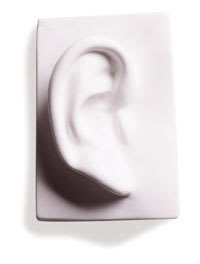LAST WORD
Who do consumers listen to? YOU!
By Steph De Long
How do your customers and patients decide what frame or lens is right for them? Do they listen to friends? Respond to advertising? Read the price tag? Sure, all of those factors play a role. But more than anything else, they listen to you.
That's exactly what we at Eyecare Business found out when we commissioned Harris Interactive to survey nearly 1,700 vision-corrected consumers about their attitudes toward optical products and services.
No matter how we asked the question-whether it was about frames, lenses, or sunwear-consumers told us that the opinion of the doctor or dispensing optician was the most important factor. Here are two examples of what eyewear consumers had to say about the value they place in your recommendations.
When asked to name the most important factors in selecting prescription eyewear, consumers surveyed reported that the opinion of the doctor, optician or salesperson was most important (11.2 percent), followed by comfort (9.3 percent), price (8.0 percent), style (7.5 percent), and technology (5.4 percent). Those numbers fly in the face of those of you who say price is paramount in purchases. What's also interesting is that, according to this survey, technology is one of the top five purchasing motivators. That underscores the importance of taking the time to present information about frames and lenses that do represent advances in technology.

When it came to prescription sunwear, the recommendation of the doctor, optician, or salesperson topped the charts at 10.3 percent. While factors like brand or designer name, technology, and lens material were important, the top factors, following the eyecare professional's recommendation, were: comfort (9.4 percent), UV ray protection (8.3 percent), lens tint (8.0 percent), price (7.7 percent), and style (7.4 percent). What's noteworthy here is not only the role of the doctor and dispenser, but the fact that the other top three factors-comfort, UV, and tint-all have to do with product performance.
This is just one of many findings in the survey that shows the importance of discussing product with patients- both the technology and performance of those products, as well as the brands that match that patient's needs.
What do consumers do with this information? Well, the problem isn't what they do with it, but the fact that most of you don't go far enough in making recommendations. According to the consumers surveyed, very few of the eye doctors these patients saw-only 24 percent-carried on any discussions about specific brands that would most benefit them. Yet, half of those who said they did recall their doctor discussing brands reported that they based their purchasing on that information.
So, next time you think that your patients and customers don't care about what you have to say, think again. If you take the time to talk, they will, indeed, listen.



